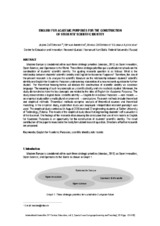Mostrar el registro sencillo del ítem
English for academic purposes for the construction of students’ scientific identity
| dc.contributor.author | Zaščerinska, Jeļena | |
| dc.contributor.author | Andreeva, Natalia | |
| dc.contributor.author | Zaščerinskis, Mihails | |
| dc.contributor.author | Aļeksejeva, Ludmila | |
| dc.date.accessioned | 2018-11-22T11:08:45Z | |
| dc.date.available | 2018-11-22T11:08:45Z | |
| dc.date.issued | 2016 | |
| dc.identifier.issn | 2444-3921 | |
| dc.identifier.uri | http://hdl.handle.net/10396/17517 | |
| dc.description.abstract | Modern Europe is considered within such three strategic priorities (Moedas, 2015) as Open Innovation, Open Science, and Openness to the World. These three strategic priorities put a particular emphasis on the construction of students’ scientific identity. The guiding research question is as follows: What is the relationship between students’ scientific identity and English for Academic Purposes? Therefore, the aim of the present research is to analyse the scientific literature on the relationship between students’ scientific identity and English for Academic Purposes underpinning elaboration of a new research question for further studies. The theoretical framing herein will discuss the construction of scientific identity via academic language. The meaning of such key concepts as scientific identity and role models is studied. Moreover, the study demonstrates how the key concepts are related to the idea of English for Academic Purposes. The study demonstrates a logical chain: scientific identity → English for Academic Purposes → role models → an empirical study within a multicultural environment → conclusions. Research methods include theoretical and empirical methods. Theoretical methods comprise analysis of theoretical sources and theoretical modelling. In the empirical study, explorative study was employed. Interpretative research paradigm was used. The empirical study carried out in August 2015 involved 22 engineering students at Tallinn University of Technology, Estonia. The results of the empirical study show that engineering students’ self-evaluation is of the low level. The findings of the research allow drawing the conclusion that use of role models in English for Academic Purposes is an opportunity for the construction of students’ scientific identity. The novel contribution of the paper is revealed in the newly formulated research question. Directions of further research are proposed. | es_ES |
| dc.format.mimetype | application/pdf | es_ES |
| dc.language.iso | eng | es_ES |
| dc.publisher | Universidad de Córdoba, UCOPress | es_ES |
| dc.rights | https://creativecommons.org/licenses/by-nc-nd/4.0/ | es_ES |
| dc.source | International Journal for 21st Century Education 3(Special), 121-130 (2016) | es_ES |
| dc.subject | English for Academic Purposes | es_ES |
| dc.subject | Scientific identity | es_ES |
| dc.subject | Role models | es_ES |
| dc.title | English for academic purposes for the construction of students’ scientific identity | es_ES |
| dc.type | info:eu-repo/semantics/article | es_ES |
| dc.relation.publisherversion | http://www.uco.es/ucopress/ojs/index.php/ij21ce/index | es_ES |
| dc.rights.accessRights | info:eu-repo/semantics/openAccess | es_ES |

